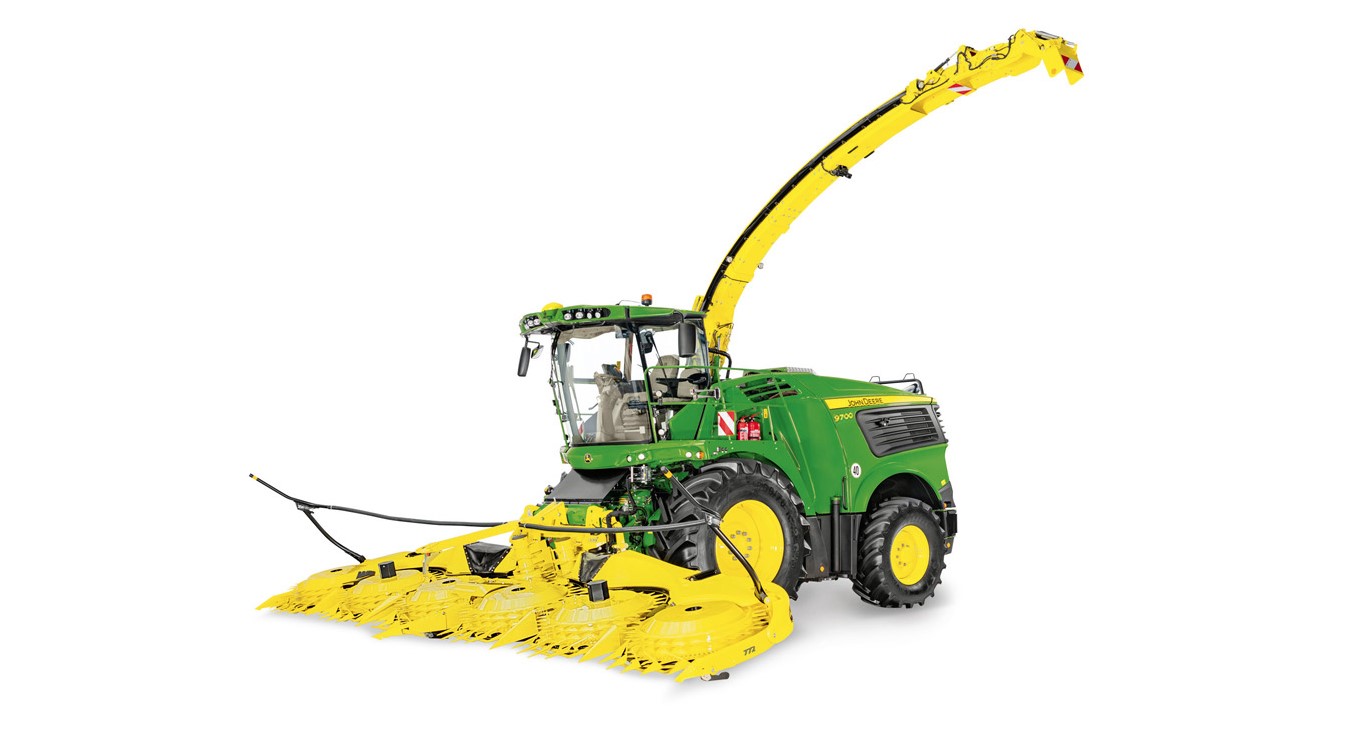Thu, 01 Sep 2022 09:24:29 CDT

John Deere has added three new Deere-powered self-propelled forage harvesters to its lineup – the 9500, 9600 and 9700. Each model addresses the needs of contractors, customer harvesters, and dairy and livestock producers challenged by increased operating costs, shorter harvesting windows and a smaller pool of skilled workers.
“John Deere expanded the horsepower offerings for our wide-body forage harvesters that include the 9500 to 9900 models to provide improved performance and made updates to maximize machine uptime and reduce cost of operation,” said Chase Milem, marketing manager with John Deere. “Customers now have more choices than ever when it comes to selecting a new John Deere forage harvester.”
The 9500 (755 max hp), 9600 (775 max hp) and 9700 (813 max hp) feature the new John Deere Power Systems JD18X, 18L engine. The new engine provides market-leading productivity with up to 13% higher efficiency, due to the diesel-only innovation of the engine that does not require DEF fluid.
The JD18X features a 750-hour service interval – an improvement of 33% compared to the previously used 13.5L engine. Since no DEF fluid is required, ownership costs are kept low, and machine reliability is increased. For customers with higher horsepower requirements, John Deere still offers the 9800 (855 max hp) and 9900 (956 max hp) models equipped with the Liebherr 24L engine.
“The ideal performance characteristics of the John Deere engine decrease fuel consumption and are perfectly aligned and synchronized for outstanding crop flow through the machine,” Milem said. “This is partly due to our industry exclusive HarvestMotion™ Plus engine technology. HarvestMotion Plus provides a unique torque-rise curve and extra power at low engine rpm, which increase power so operators can push through tough conditions while maintaining crop-harvesting quality.”
In addition, each 9000 Series comes equipped with a new spout that provides better operator visibility while unloading and boosts machine reliability compared to previous models. Thanks to the addition of more clean-outs and a change in the geometry of the spout, customers can run in “sticky” crop conditions for longer periods of time without plugging. This helps make the forage harvester easier to load while providing more comfort to the operator than previous models.
“Contractors and custom harvesters will appreciate the constant maximum throughput these forage harvesters provide, along with a cab that features enhanced operator visibility and comfort,” Milem said. “Reliability, low cost of operation, increased quality of completed work, minimized daily maintenance requirements and reduced total fluid consumption were key improvements John Deere made that will benefit customers.”
One way dairy and livestock operations can take full advantage of the improved forage quality and kernel processing of the 9000 Series is by using John Deere Premium or XStream KP™ kernel processors. “Each delivers exceptional corn silage processing scores regardless of cut length,” Milem said.
John Deere offers integrated technology for self-propelled forage harvesters, with fully integrated AutoTrac™ RowSense™ guidance, Active Fill Control with rear unloading, and the Generation 4 Universal Display. “These are industry-leading features that are available as options from the factory,” Milem said.
Another option Milem highlighted is John Deere HarvestLab™ 3000, which provides on-the-go constituent sensing and documentation. “Customers have told us for years how much they appreciate the versatility of HarvestLab 3000,” Milem said. “It can be used as a manure sensing tool and as a stand-alone stationary test unit that can analyze up to seven constituents. These constituents include NDF, crude protein, moisture, sugar, starch, crude fiber, ash and ADF. Using the documented information, farmers can quickly analyze data from worked fields, adjust fertilizer use, select optimal varieties for the upcoming season, and improve water management.”
When it comes to staying connected to their forage harvesters, Milem said John Deere makes it easy by including JDLink™ hardware in base equipment on the 9000 Series and the ability to turn on the JDLink Connection in John Deere Operations Center™ for free. A JDLink connection allows field and machine data from the cab to be sent wirelessly to Operations Center. The Operations Center mobile app gives access to that field and machine data from anywhere, anytime. Custom harvesters can set-up work plans before harvesting and send them wirelessly to the Gen 4 display in the cab, monitor harvest progress, and analyze results and machine data. Having access to this data can support operators, saving owners time and money.


















